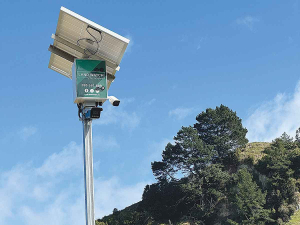Open Country opens butter plant
When American retail giant Cosco came to audit Open Country Dairy’s new butter plant at the Waharoa site and give the green light to supply their American stores, they allowed themselves a week for the exercise.
 Advances in on-farm surveillance technology are now helping farmers take a more proactive approach to security.
Advances in on-farm surveillance technology are now helping farmers take a more proactive approach to security.
OPINION: Dairy farmers are under increasing pressure to safeguard their livestock, equipment and operations from a range of security threats.
From biosecurity breaches, cattle theft, activist trespassing and cybersecurity threats to occupational health and safety, protecting productivity is becoming just as important as managing herd health and milk output.
While traditional security measures play a role, advances in on-farm surveillance technology are now helping dairy producers take a more proactive approach to security and farm management.
Rigorous protocols, systems and processes required within the dairy industry often leave producers overwhelmed in 24/7 monitoring activities. But how do you monitor employee welfare and safety, as well as biosecurity, whilst also keeping an eye on the cows in the paddock and the milking shed?
Integrating the entire operation through multiple watchful eyes is Land Watch New Zealand’s way of keeping dairy producers, their cattle and their farms safe.
Land Watch New Zealand has witnessed a rapid increase in interest in surveillance solutions among dairy farmers as producers look for ways to enhance security, improve efficiency, and reduce risks. With this insight, we reviewed the multiple operational points within a dairy farm that could be suspect to security threats, as well as considering where overall management of the property could be optimised.
Farm entry points - the first barrier of security. Staff vehicles, couriers, trucks delivering fuel and other suppliers all enter dairy farms multiple times a day. Controlling access and keeping a record of vehicle movements helps track milk collection and deliveries. With Automatic Number Plate Recognition (ANPR), footage can now be cross-referenced with farm records for greater accountability. Biosecurity breaches often occur mostly at this first point of entry. Whether it is the delivery driver or the employee, having eyes on this point of entry can enable linkages to the biosecurity breach.
Shed security - the operational hub. Machinery, tools, supplies and parts are all located within the sheds and can be exposed to free picking by thieves. Monitoring movement within and around the sheds can help deter theft and unauthorised usage of farm machinery. Video records of work areas can also provide crucial insights in case of an accident, ensuring that safety protocols are being followed and providing evidence for incident reviews.
Animal and employee welfare - important adherence to industry welfare standards. Surveillance can clarify events in case of an injury or dispute, assisting in investigations and safety improvements.
Quality control - monitor adherence to dairy hygiene control measures. Reviewing footage of milk transfers can help maintain hygiene standards and track any anomalies in the collection process.
Paddock surveillance - livestock is at the heart of all operations. Keeping an eye on stock movements, herd conditions, and calving paddocks can improve feed and stock management, as well as animal welfare.
Fuel surveillance - Fuel is one of the most expensive inputs on a farm, and its proper management can save thousands of dollars annually.
New Zealand’s biosecurity has been a recent topic of conversation with the consultation and amendment to the Biosecurity Act 1993. The proposed amendments aim to modernise and strengthen the country’s biosecurity system across six key areas, including improved decision- making, funding, border processes, emergency response, and longterm pest management. The changes also seek to enhance surveillance and align the Act more effectively with other relevant legislation.
Every stakeholder along the agricultural supply chain has a role to play. Having an extra set of eyes on all operational points means manual checks can be reduced, whilst ensuring compliance is being adhered to. Backed by industry-leading surveillance technology, producers have the confidence that their biosecurity measures are being upheld—even when they themselves aren’t watching.
Rather than leaving things to chance, implementing a well-structured security plan can provide peace of mind and operational efficiency.
In an industry where every drop of milk counts, having a structured security plan ensures that nothing is left to chance.
John Hill is co-founder of Land Watch New Zealand.
Fonterra’s impending exit from the Australian dairy industry is a major event but the story doesn’t change too much for farmers.
Expect greater collaboration between Massey University’s school of Agriculture and Environment and Ireland’s leading agriculture university, the University College of Dublin (UCD), in the future.
A partnership between Torere Macadamias Ltd and the Riddet Institute aims to unlock value from macadamia nuts while growing the next generation of Māori agribusiness researchers.
A new partnership between Dairy Women’s Network (DWN) and NZAgbiz aims to make evidence-based calf rearing practices accessible to all farm teams.
Despite some trying circumstances recently, the cherry season looks set to emerge on top of things.
Changed logos on shirts otherwise it will be business as usual when Fonterra’s consumer and related businesses are expected to change hands next month.

OPINION: Here w go: the election date is set for November 7 and the politicians are out of the gate…
OPINION: ECan data was released a few days ago showing Canterbury farmers have made “giant strides on environmental performance”.